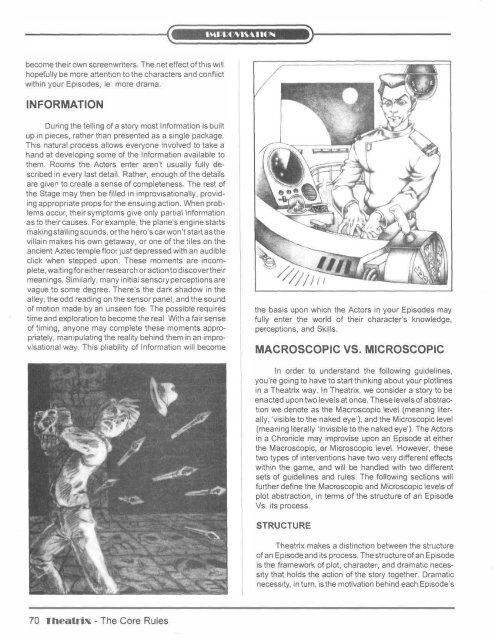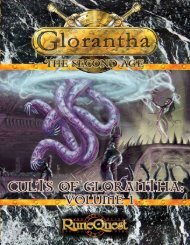Untitled - Index of - Free
Untitled - Index of - Free
Untitled - Index of - Free
Create successful ePaper yourself
Turn your PDF publications into a flip-book with our unique Google optimized e-Paper software.
ecome their own screenwriters. The net effect <strong>of</strong> this will<br />
hopefully be more attention to the characters and conflict<br />
within your Episodes, ie more drama.<br />
INFORMATION<br />
During the telling <strong>of</strong> a story most Information rs built<br />
up in pieces, rather than presented as a single package.<br />
This natural process allows everyone involved to take a<br />
hand at developing some <strong>of</strong> the Information available to<br />
them. Rooms the Actors enter aren't usually fully de<br />
scribed in every last detail. Rather, enough <strong>of</strong> the details<br />
are given to create a sense <strong>of</strong> completeness. The rest <strong>of</strong><br />
the Stage may then be filled in improvisationally, provid<br />
ing appropriate props for the ensuing action. When prob<br />
lems occur, their symptoms give only partial Information<br />
as to their causes. For example, the plane's engine starts<br />
making stalling sounds, or the hero's car won't start as the<br />
villain makes his own getaway, or one <strong>of</strong> the tiles on the<br />
ancient Aztec temple floor just depressed with an audible<br />
click when stepped upon. These moments are incom<br />
plete, waiting for either research or action to discover their<br />
meanings. Similarly, many initial sensory perceptions are<br />
vague to some degree. There's the dark shadow in the<br />
alley, the odd reading on the sensor panel, and the sound<br />
<strong>of</strong> motion made by an unseen foe. The possible requires<br />
time and exploration to become the real. With a fair sense<br />
<strong>of</strong> timing, anyone may complete these moments appro<br />
priately, manipulating the reality behind them in an impro<br />
visational way. This pliability <strong>of</strong> Information will become<br />
70 Theatrix - The Core Rules<br />
the basis upon which the Actors in your Episodes may<br />
fully enter the world <strong>of</strong> their character's knowledge,<br />
perceptions, and Skills.<br />
MACROSCOPIC VS. MICROSCOPIC<br />
In order to understand the following guidelines,<br />
you're going to have to start thinking about your plotlines<br />
in a Theatrix way. In Theatrix, we consider a story to be<br />
enacted upon two levels at once. These levels <strong>of</strong> abstrac<br />
tion we denote as the Macroscopic level (meaning liter<br />
ally, 'visible to the naked eye'), and the Microscopic level<br />
(meaning literally 'invisible to the naked eye'). The Actors<br />
in a Chronicle may improvise upon an Episode at either<br />
the Macroscopic, or Microscopic level. However, these<br />
two types <strong>of</strong> interventions have two very different effects<br />
within the game, and will be handled w1th two different<br />
sets <strong>of</strong> guidelines and rules. The following sections will<br />
further define the Macroscopic and Microscopic levels <strong>of</strong><br />
plot abstraction, in terms <strong>of</strong> the structure <strong>of</strong> an Episode<br />
Vs. its process.<br />
STRUCTURE<br />
Theatrix makes a distinction between the structure<br />
<strong>of</strong> an Episode and its process. The structure <strong>of</strong> an Episode<br />
is the framework <strong>of</strong> plot, character, and dramatic neces<br />
sity that holds the action <strong>of</strong> the story together. Dramatic<br />
necessity, in turn, is the motivation behind each Episode's



